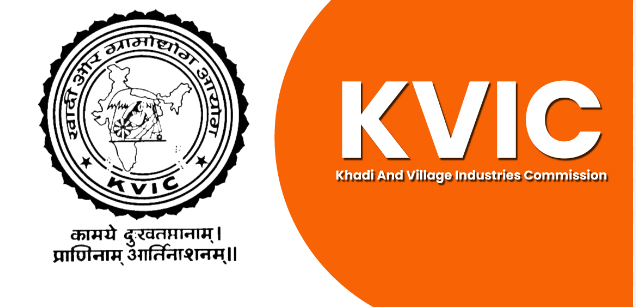Khadi and Village Industries Commission
The Khadi and Village Industries Commission (KVIC) is a statutory body formed by the Government of India, under the Act of Parliament, ‘Khadi and Village Industries Commission Act of 1956’. It is an apex organisation under the Ministry of Micro, Small and Medium Enterprises, with regard to khadi and village industries within India, which seeks to – “plan, promote, facilitate, organise and assist in the establishment and development of khadi and village industries in the rural areas in coordination with other agencies engaged in rural development wherever necessary.”
History
The Khadi and Village Industries Commission (KVIC) was established in 1957, taking over from the All India Khadi and Village Industries Board, which was set up in 1953. However, the origins of the Khadi movement in India can be traced back to the Swadeshi movement, which was initiated by Mahatma Gandhi in 1905 to promote self-reliance and indigenous industries. Gandhiji saw khadi as a symbol of self-sufficiency, self-reliance, and economic freedom. He believed that by spinning khadi, people could become self-reliant and break free from the shackles of British colonialism.
Objectives
The main objectives of KVIC are:
- The social objective of providing employment in rural areas
- The economic objective of producing saleable articles
- The wider objective of creating self-reliance amongst people and building up a strong rural community spirit
Functions
The functions of KVIC as defined under the KVIC Act of 1956 include:
- To plan and organise training of persons employed or desirous of seeking employment in khadi and village industries
- To build reserves of raw materials and implements and supply them to persons engaged or likely to be engaged in production of khadi or village industries
- To promote sale and marketing of khadi or products of village industries or handicrafts
- To encourage and promote research in the technology used in khadi and village industries
Initiatives and Schemes
KVIC has been instrumental in promoting and developing khadi and village industries through various initiatives and schemes. Some of the notable ones are:
- Prime Minister’s Employment Generation Programme (PMEGP): This is a flagship scheme of the Government of India, implemented by KVIC, aimed at generating self-employment opportunities through the establishment of micro-enterprises in the non-farm sector.
- Honey Mission: KVIC has launched the Honey Mission to promote beekeeping and increase the production of honey in the country. The mission aims to provide sustainable employment and income to farmers and unemployed youth.
- Kumhar Sashaktikaran Yojana: This scheme aims to revive and strengthen the pottery industry in the country by providing potters with modern equipment, training, and marketing support.
- Leather Artisans’ Empowerment Scheme: This scheme seeks to empower leather artisans by providing them with modern tools, equipment, and training to improve the quality of their products and increase their income.
Impact
KVIC has played a significant role in promoting khadi and village industries in India. It has helped in generating employment opportunities in rural areas, especially for women and disadvantaged sections of society. KVIC has also contributed to the growth of the rural economy by promoting the use of local resources and skills.
According to the latest available data, KVIC has assisted in the establishment of over 2.5 million small-scale units, generating employment for over 14 million people. The total production of khadi and village industries under KVIC has also increased from Rs. 65,393 crore in 2014-15 to Rs. 1,15,415 crore in 2020-21, registering a growth of over 76%.
The Khadi and Village Industries Commission has been instrumental in promoting and developing khadi and village industries in India. It has not only helped in generating employment opportunities in rural areas but has also contributed to the growth of the rural economy. With its various initiatives and schemes, KVIC continues to play a vital role in the socio-economic development of the country.


